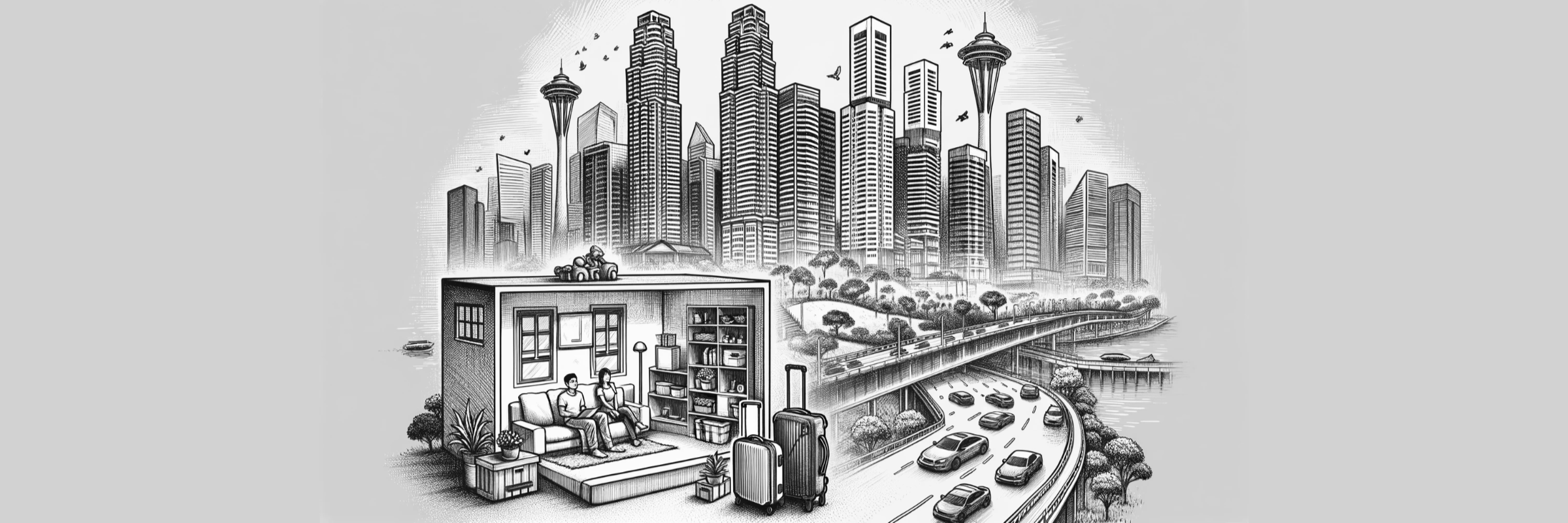Rethinking Home Ownership: Is Renting Better in Today’s Market?
Every week, I’ll be sharing practical tips and invaluable knowledge to guide you on your path to financial independence.
A historical context of the ideal home ownership in Singapore
In Singapore, the dream of owning a home is deeply rooted in our cultural and historical narrative. This ideal emerged in the early years of nation-building, as the government sought to provide stable, affordable housing to its rapidly growing population. The establishment of the Housing Development Board (HDB) in 1960 marked a pivotal moment, initiating a nationwide housing program that transformed the physical and social landscape of the country. From clusters of kampungs to high-rise complexes, this monumental shift not only provided shelter but also cultivated a sense of national identity and pride in home ownership.
However, this ideal was not just a social construct; it was also an economic strategy. Owning a home was seen as a path to financial stability and social mobility. The government’s policies made home ownership attainable for the masses, and this was reflected in the high ownership rates, which became a hallmark of Singapore’s success. This historical context sets the stage for understanding the current housing sentiments and preferences among Singaporeans.
An overview of the Singapore housing market
Singapore’s housing market is characterized by its high rate of public housing ownership and the significant role of government policy. The majority of Singaporeans live in HDB flats, a testament to the effectiveness of public housing initiatives. However, this market is also influenced by a myriad of factors including economic trends, population growth, and government interventions such as cooling measures and loan regulations.
In recent years, the market has witnessed fluctuating property prices, influenced by both local and global economic conditions. The introduction of cooling measures, such as the Additional Buyer’s Stamp Duty (ABSD) and the Total Debt Servicing Ratio (TDSR), has been instrumental in regulating the market. These measures, aimed at maintaining a stable and sustainable property market, have implications for both potential homeowners and investors. Understanding these dynamics is crucial for anyone navigating the Singapore housing market.
Flexibility and financial considerations for renting
The concept of renting, traditionally seen as less favorable in Singapore, deserves reconsideration under current market conditions. Renting offers a level of flexibility that is hard to match with home ownership. It caters to those who prefer not to be tied down by a long-term mortgage or those who anticipate frequent relocation due to career or personal reasons.
From a financial standpoint, renting can be a smart move, especially for those who are not ready to commit to the large financial outlay required for purchasing a property. Renting eliminates the need for a substantial down payment, property taxes, and maintenance costs, which are inherent in home ownership. It also provides the opportunity to live in a location or property type that might be unaffordable to purchase, offering a lifestyle choice that aligns with individual preferences and needs.
The equity and stability of home ownership
Owning a home is often perceived as a key financial goal, offering both a sense of stability and the opportunity to build equity. The accumulation of equity in a property is a form of wealth creation, as property values typically appreciate over time. This aspect of home ownership is particularly appealing in a stable and growing economy like Singapore.
Personally, I chose to buy due to personal circumstances where my family needed a family home urgently. However, I recognise home ownership may not be the ideal path for everyone.
However, the financial commitment of owning a home extends beyond the initial purchase. It involves ongoing expenses such as mortgage repayments, maintenance costs, property taxes, and interest payments. These financial obligations require careful planning and budgeting, as they can impact one’s overall financial health. Homeowners must also be prepared for potential market fluctuations that can affect property values and their equity.
Long-term financial implications of renting and buying
When comparing the long-term financial implications of renting and buying, it’s important to consider the total costs and potential returns of each option. Home ownership can be a lucrative investment if property values increase, but it also entails ongoing expenses and the risk of market volatility. The cost of buying a home includes not only the purchase price but also additional expenses such as stamp duties, legal fees, and renovation costs.
On the other hand, while renting may seem like a non-investing expense, it offers greater liquidity and financial flexibility. This can be advantageous for individuals who prefer to invest their capital in other avenues, such as stocks, bonds, or other investment vehicles that might offer higher returns. Renting also allows individuals to adapt quickly to life changes without the burden of selling a property, which can be time-consuming and costly.
The perception of “wasted money” and asset accumulation
One of the primary concerns about renting is the perception that paying rent is equivalent to throwing money away. However, this perspective overlooks the financial benefits and flexibility that renting can offer. Renting can be a strategic choice, especially in a market where property prices are high and the potential for appreciation is uncertain.
Renting also allows for diversification of investments. Instead of tying up a large sum of money in a single asset (property), renting provides the opportunity to invest in different assets, potentially leading to better risk management and higher returns. This approach can be particularly beneficial for those who do not see themselves staying in Singapore in the long run, or are not ready for the long-term commitment and financial responsibility of owning a home.
Consideration of individual goals and financial health
The decision between renting and buying should be based on personal financial circumstances and life goals. It’s important to consider one’s career stability, family plans, lifestyle choices, and financial health. For some, the security and permanence of owning a home align with their long-term objectives. For others, the flexibility and reduced financial burden of renting may be more suitable.
Financial health is also a critical factor. Prospective homeowners should evaluate their ability to afford a home without compromising other financial goals and obligations. This includes assessing savings, income stability, emergency funds, and existing debts. The decision should be made in the context of a comprehensive personal financial plan.
Social and psychological aspects of home ownership
Beyond the financial considerations, home ownership in Singapore is deeply intertwined with social and psychological factors. Owning a home is often associated with achieving a major life milestone, providing a sense of accomplishment, stability, and belonging. It’s a significant cultural norm and a symbol of success and security for many Singaporeans.
The psychological benefits of owning a home, such as a sense of permanence and control over one’s living space, can be substantial. However, these benefits need to be weighed against the responsibilities and stresses that come with home ownership, including financial strain, maintenance responsibilities, and the potential impact on lifestyle and mobility.
The future of housing in Singapore: Market trends and changing needs
As Singapore continues to evolve, so do its housing needs and preferences. The future of housing in Singapore is likely to be shaped by a variety of factors, including demographic shifts, technological advancements, and evolving lifestyle preferences. Younger generations, for example, may prioritize flexibility, sustainability, and community-oriented living spaces over traditional housing models.
The government’s role in shaping housing policies will continue to be significant. Policies that address affordability, inclusivity, and sustainability will be key in meeting the changing needs of the population. Additionally, the rise of remote work and digital nomad lifestyles could influence housing preferences, potentially leading to a greater acceptance and desire for rental options.
Conclusion: Making an informed decision
Choosing between renting and buying is a significant decision that should not be taken lightly. It requires a thorough assessment of one’s financial situation, personal goals, and lifestyle preferences. In Singapore’s dynamic housing market, staying informed and adaptable is crucial.
Remember, there is no universally correct answer; what matters is making a choice that aligns with your unique circumstances and future aspirations. Whether you decide to buy a home or opt for the flexibility of renting, ensure that your decision supports your overall financial well-being and life goals. In the end, the right choice is the one that brings you peace of mind and aligns with your vision for the future.
In a rapidly changing world, the traditional paths may not always be the most suitable. The key is to remain open-minded, informed, and adaptable, whether you’re navigating the housing market or making other significant life decisions. By understanding the pros and cons of both renting and buying, you can make a choice that not only makes financial sense but also resonates with your personal values and lifestyle preferences.
The journey towards finding your ideal home, whether it’s a rented apartment or a property you own, is a deeply personal one. It reflects your priorities, aspirations, and the life you envision for yourself. As you weigh your options, consider not just the financial implications, but also the emotional and psychological impact of your decision. Home, after all, is more than just a physical space; it’s a place where you build your life, create memories, and find comfort and security.
As Singapore continues to grow and evolve, so too will its housing market and the preferences of its residents. Staying abreast of market trends, government policies, and changing societal norms will help you navigate this complex landscape. Whether you ultimately decide to rent or buy, the most important thing is to choose a path that brings you happiness, stability, and fulfillment.
To sum it up, the question of whether to rent or buy in today’s market has no straightforward answer. It depends on a multitude of factors, including your financial situation, life stage, career plans, and personal preferences. By carefully considering these factors and staying informed about market conditions and trends, you can make a decision that is right for you. Remember, the best choice is one that aligns with your personal circumstances and helps you achieve your long-term goals. Whether you choose the path of home ownership or opt for the flexibility of renting, make sure it’s a decision that you are comfortable with and that supports your overall life plan.


